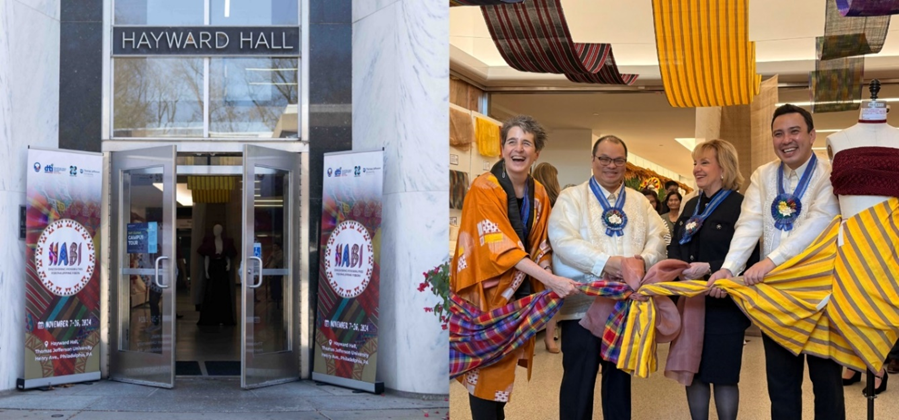PHILADELPHIA, Pennsylvania—The Philippines launched the “HABI: Discovering Possibilities for Philippine Fibers” exhibit at Thomas Jefferson University on November 7 to showcase Philippine fibers and their unique applications in fashion, design, and industry.
The exhibit is a collective effort among the Department of Trade and Industry-Philippine Trade and Investment Center (DTI-PTIC) in New York, the Philippine Consulate General in New York, the Department of Science and Technology–Philippine Textile Research Institute (DOST-PTRI), and Thomas Jefferson University.
Supported by the DTI’s Malikhaing Pinoy Program, the HABI features fibers such as “abaca” or Manila hemp, “piña” or pineapple fiber, and bamboo. From these fibers, handwoven textiles were crafted by indigenous communities and artisans across the Philippines, including T’nalak, Piña Seda, Kantarines, Pinilian, Yakan, Hablon, and Pigi.
Handwoven fabrics, including T’nalak, Piña seda, Kantarines, Pinilian, Kankanaey, Hablon, Pigi, and others, crafted by Indigenous communities and local artisans from various regions in the Philippines, are on display at Hayward Hall. QR codes accompany each textile, allowing visitors to explore the unique origins and cultural significance of each weaving tradition. (Photos by PTIC-NY)
Produced primarily by women-led micro and small enterprises, these weaves reflect cultural diversity, resilience, and the entrepreneurial spirit of Filipino weaving communities.
During the launch, DTI Trade Commissioner Benedict M. Uy highlighted the cultural and economic significance of the exhibit.
“The HABI exhibit not only showcases our cultural legacy but also highlights the vast opportunities for Philippine fibers in the global markets. Each fiber, each weave, tells a story of heritage, resilience, and innovation, illustrating the potential of these materials for a global audience,” he said.
Each display has a corresponding QR code for visitors to discover the origins and cultural significance of the textile’s provincial roots.
Following the opening ceremony, a Fireside Chat was conducted where the National Commission for Culture and the Arts and the Office of Senator Loren B. Legarda provided an in-depth conversation on Philippine textiles.


Moderated by Professor Marcia Weiss, Interim Dean of Thomas Jefferson University School of Design and Engineering, the Chat tackled diverse topics such as cultural preservation, sustainable practices, and the global potential of Philippine fibers.
DTI Undersecretary Rafaelita Aldaba, during the Fireside Chat, underscored the Philippine fiber industry’s impact on economic growth and job creation, which supports over 1.5 million livelihoods, with women comprising 68% of the workforce.
“Our textiles not only preserve our heritage but also create jobs and economic value. This is reflected in the growing global demand for eco-friendly fashion that leverages sustainable fibers like abaca and piña. To seize these market opportunities, events like HABI connect Philippine fibers to the global market, fostering collaboration and showcasing Filipino artisans’ potential,” the undersecretary said.
As part of the event, the panel collectively underlined the importance of preserving traditional techniques while embracing innovation to elevate Philippine textiles on the world stage.
Panelists included DTI Trade Commissioner Benedict M. Uy, DOST-PTRI Director Julius L. Leaño Jr., Philippine Fiber Industry Development Authority Executive Director Evelyn B. Cagasan, Cultural Critic Marian Pastor Roces, and Maison Métisse Founder Adrienne Charuel.


Moreover, the event featured the leadership of Thomas Jefferson University, including President Dr. Susan C. Aldridge, Provost Dr. Matt D. Baker, Senior Vice President Dr. Jeff Cromarty, and Kanbar College Dean Dr. Ron Kander. Other attendees were faculty, students, and members of the Filipino community also celebrated the milestone in cultural and academic partnership.
Citing the success of the event, Dr. Aldridge expressed her optimism for future collaborations between their institution and the Philippines. “We envision scholarships, joint projects in textiles, fashion, and sustainability, as well as opportunities for faculty exchanges. This partnership opens a bright future for us all.”
The “HABI: Discovering Possibilities for Philippine Fibers” exhibit fosters a cross-cultural dialogue that highlights the Philippines’ rich textile heritage and its expanding role in the global marketplace. It is open to the public at Hayward Hall of Thomas Jefferson University until 16 December 2024.

